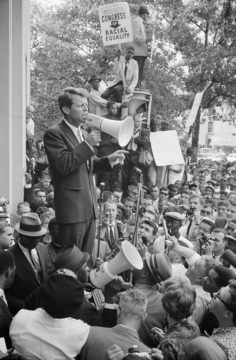by Michael Liss
There was a sense everywhere, in 1968, that things were giving. That man had not merely lost control of his history, but might never regain it. —Garry Wills, Nixon Agonistes: The Crisis of the Self-Made Man

Last month, I wrote about Eugene McCarthy’s Vietnam-based primary challenge to Lyndon Baines Johnson’s reelection campaign, the angst-ridden mid-March entry into the race by Robert F. Kennedy, and LBJ’s stunning withdrawal on March 31, 1968. I ended with April 4, when the “Dreamer,” Martin Luther King, was assassinated.
Some of the chaos that ensued is the subject of this piece. “Things were giving,” seemingly everywhere, and all at the same time. America’s ability to deflect the course of history as it accelerated toward the unknown was disappearing. The months that followed the King assassination were punctuated by more violence, more uncertainty, and the continued deterioration of social discourse.
None of this appeared out of thin air. Grassroots efforts on Vietnam and on civil rights had been intensifying for years, as had been the backlash to those movements. FDR’s New Deal coalition was fraying, most notably in the South, but also in the industrial Midwest. 1968 was also to be the last stand of the “Liberal” Republicans, people like Nelson Rockefeller, Charles Percy, and John Lindsay. We think about them and their ambitions with an amused raised eyebrow, but, at the time, they were men of reputation and influence.
There were so many crosscurrents, so many strange alliances, that it’s difficult to trace each causation, but if you want to pick up on an organizing thread other than Vietnam, look to George Wallace. History frames Wallace largely as the segregationist that he was (after losing his first run for office for being more moderate than his opponent, he vowed “never to be out-n…ed again”). It sometimes skips over how Wallace had a broader message, anchored by the emotional appeal of his racism, but also including perennial themes of law and order and economic and social grievances that resonated in people’s lives. Read more »
